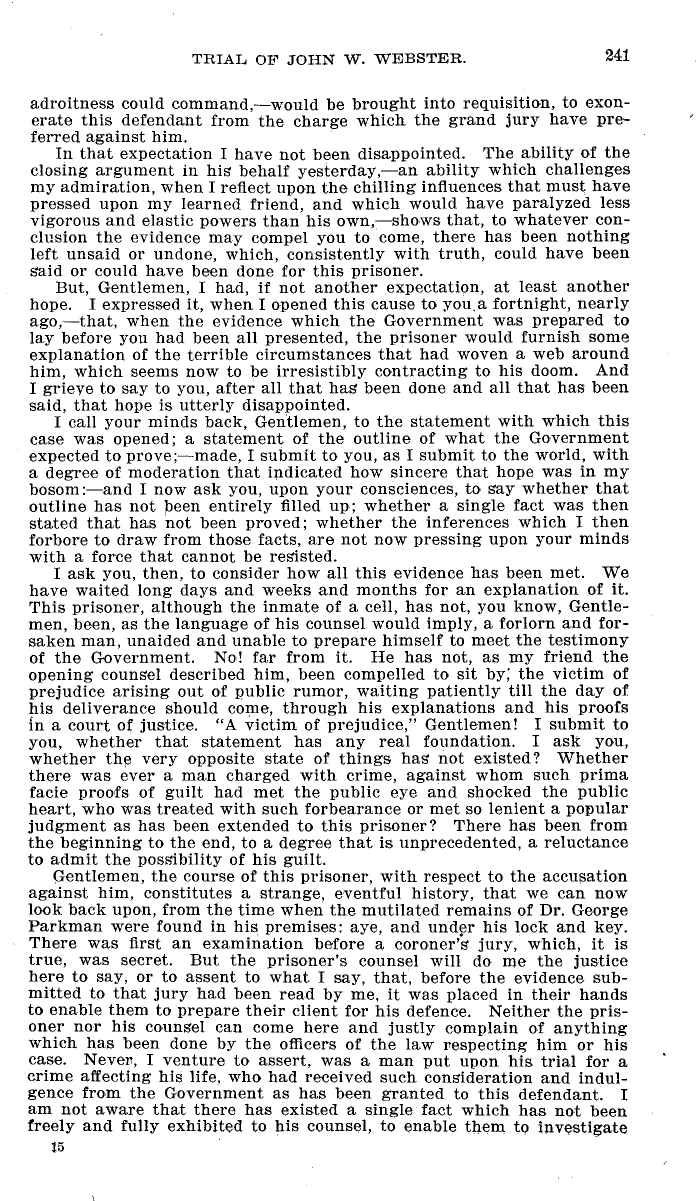|
TRIAL OF JOHN W. WEBSTER. 241
adroitness could command,-would be brought into requisition, to exon-
erate this defendant from the charge which the grand jury have pre-
ferred against him.
In that expectation I have not been disappointed. The ability of the
closing argument in his behalf yesterday,-an ability which challenges
my admiration, when I reflect upon the chilling influences that must have
pressed upon my learned friend, and which would have paralyzed less
vigorous and elastic powers than his own, shows that, to whatever con-
clusion the evidence may compel you to come, there has been nothing
left unsaid or undone, which, consistently with truth, could have been
said or could have been done for this prisoner.
But, Gentlemen, I had, if not another expectation, at least another
hope. I expressed it, when I opened this cause to you .a fortnight, nearly
ago,-that, when the evidence which the Government was prepared to
lay before you had been all presented, the prisoner would furnish some
explanation of the terrible circumstances that had woven a web around
him, which seems now to be irresistibly contracting to his doom. And
I grieve to say to you, after all that has been done and all that has been
said, that hope is utterly disappointed.
I call your minds back, Gentlemen, to the statement with which this
case was opened; a statement of the outline of what the Government
expected to prove; made, I submit to you, as I submit to the world, with
a degree of moderation that indicated how sincere that hope was in my
bosom:-and I now ask you, upon your consciences, to say whether that
outline has not been entirely filled up; whether a single fact was then
stated that has not been proved; whether the inferences which I then
forbore to draw from those facts, are not now pressing upon your minds
with a force that cannot be resisted.
I ask you, then, to consider how all this evidence has been met. We
have waited long days and weeks and months for an explanation of it.
This prisoner, although the inmate of a cell, has not, you know, Gentle-
men, been, as the language of his counsel would imply, a forlorn and for-
saken man, unaided and unable to prepare himself to meet the testimony
of the Government. No! far from it. He has not, as my friend the
opening counsel described him, been compelled to sit by; the victim of
prejudice arising out of public rumor, waiting patiently till the day of
his deliverance should come, through his explanations and his proofs
in a court of justice. "A victim of prejudice," Gentlemen! I submit to
you, whether that statement has any real foundation. I ask you,
whether the very opposite state of things has not existed? Whether
there was ever a man charged with crime, against whom such prima
facie proofs of guilt had met the public eye and shocked the public
heart, who was treated with such forbearance or met so lenient a popular
judgment as has been extended to this prisoner? There has been from
the beginning to the end, to a degree that is unprecedented, a reluctance
to admit the possibility of his guilt.
Gentlemen, the course of this prisoner, with respect to the accusation
against him, constitutes a strange, eventful history, that we can now
look back upon, from the time when the mutilated remains of Dr. George
Parkman were found in his premises: aye, and under his lock and key.
There was first an examination before a coroner's jury, which, it is
true, was secret. But the prisoner's counsel will do me the justice
here to say, or to assent to what I say, that, before the evidence sub-
mitted to that jury had been read by me, it was placed in their hands
to enable them to prepare their client for his defence. Neither the pris-
oner nor his counsel can come here and justly complain of anything
which has been done by the officers of the law respecting him or his
case. Never, I venture to assert, was a man put upon his trial for a
crime affecting his life, who had received such consideration and indul-
gence from the Government as has been granted to this defendant. I
am not aware that there has existed a single fact which has not been
freely and fully exhibited to his counsel, to enable them to investigate
15
|

